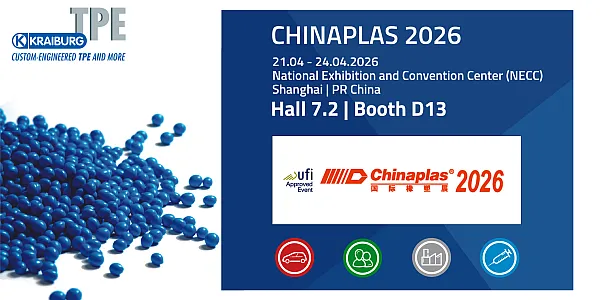Klare Richtlinie für Medical Grade Plastics
Thermoplastische Elastomere von KRAIBURG TPE im Einklang mit neuer VDI-Richtlinie 2017
KRAIBURG TPE gibt bekannt, dass seine Compounds der THERMOLAST® M-Familie die Anforderungen der im Juli 2019 vom VDI verabschiedeten Richtlinie 2017 für ‚Medical Grade Plastics‘ (MGP) erfüllen. Als Leitfaden für die Hersteller und Anwender von Kunststoffen für Medizinalprodukte regelt die VDI 2017 die Ansprüche an qualifizierte MGP, von den Basisanforderungen über die Rezepturkonstanz und das Änderungsmanagement bis hin zu den Abkündigungsfristen.
Im Richtlinienausschuss (RA) 2017 Medical Grade Plastics hatten sich 20 Materialanbieter, Anwender und Benannte Stellen zusammengefunden, um einen gemeinsamen Mindeststandard für MGP zu erarbeiten. Denn trotz der Drug Master Files (DMF) der US-amerikanischen Lebens- und Arzneimittelbehörde FDA und der ISO 10993 zur humanverträglichen Zertifizierung von Medizinalprodukten (einschließlich Implantaten, In-vitro-Diagnostika und pharmazeutischer Verpackungen) sowie der ab Mai 2020 verbindlichen EU-Medizinprodukteverordnung MPV 2017/745 bestehen in der EU und den USA bis heute keine eindeutigen Richtlinien oder Standards für die in diesem vitalen Einsatzbereich verwendeten Polymere.
„Die VDI 2017 ist ein wichtiger erster Schritt zur Harmonisierung des Leistungsspektrums, das ein Medical Grade Plastic erfüllen muss. Die Richtlinie erzeugt bei der Kommunikation zwischen den Herstellern von MGPs und den OEMs, bzw. den Herstellern von Medizin-, Pharma- und In-vitro-Produkten verbindliche Orientierungshilfen“, sagt Oliver Kluge, RA-Mitglied und Medizinprodukte Berater bei KRAIBURG TPE. „Dabei lässt die neue Richtlinie ausdrücklich Raum für weiterreichende Absprachen zwischen den jeweiligen Materiallieferanten und Kunden.“
Als eine der wesentlichen Auswirkungen der VDI 2017 gilt, dass sie die Auswahl der zulässigen Roh- und Hilfsstoffe für MGP einschränkt, sodass einige Hersteller ihre Materialformulierungen anpassen müssen. Darüber hinaus regelt die neue Richtlinie die kontrollierte Konstanz der Zusammensetzung spezifischer Compounds auf der Basis eines dokumentierten Änderungsmanagements (Change Control), das deren langfristige Eignung sicherstellt und aufwändige Nachprüfungen erübrigt. Die VDI 2017 sieht auch längere Übergangsfristen für abgekündigte Materialien vor, was den Anwendern mehr Liefersicherheit bietet.
„Unsere bewährten Thermoplastischen Elastomere der THERMOLAST® M Familie – für ‚Medical‘ – entsprechen schon seit Langem den nunmehr festgeschriebenen Forderungen an MGP, sodass wir nur bei einigen wenigen Spezifikationen konkreter werden mussten“, führt Kluge aus. „Doch wir werden auch an künftigen Revisionen der Richtlinie aktiv mitarbeiten, um das gesicherte Profil von MGPs weiter zu schärfen.“ Vor dem Hintergrund der eingangs erwähnten MPV 2017/745 strebt der RA VDI 2017 Medical Grade Plastics schon für 2020 eine erste Revision der aktuellen Fassung an. Während einer VDI-Konferenz zum Thema Anfang Juli 2019 in Berlin wurde das Regelwerk umfassend vorgestellt und erörtert.
Breites Sortiment an zertifizierten Medical Grade TPE
Alle THERMOLAST® M Compounds sind frei von Schwermetallen, Latex, PVC und Phthalaten und werden in höchster Reinheit ausschließlich auf speziell dafür eingerichteten Anlagen hergestellt. Ausgewählte Materialtypen sind nach USP Class VI (Chapter 88), ISO 10993-5 (Zytotoxizität), ISO 10993-10 (Intrakutan-Irritation), ISO 10993-11 (Akute System-Toxizität) und ISO 10993-4 (Hämolyse) geprüft und zertifiziert. Die Qualitätssicherung der verwendeten Rohstoffe umfasst auch die vollständige Rückverfolgbarkeit der Chargen bei den Zulieferern. Zudem entsprechen die Materialien von KRAIBURG TPE den REACH und RoHS Anforderungen.
Außerdem ist das THERMOLAST® M Portfolio in FDA Drug Master Files (DMF) gelistet, um die Rezepturen nach einem verpflichtenden Change-Control-System zu dokumentieren. Im Einklang mit der neuen VDI 2017 garantiert KRAIBURG TPE des Weiteren, dass auch die Herstellprozesse in das Änderungsmanagement einbezogen werden und die Originalrezeptur eines derartigen Compounds nach einer etwaigen Änderungs- oder Abkündigungsmitteilung noch mindestens 24 Monate lang parallel zur neuen Type zur Verfügung steht. Dies bietet Kunden aus dem Gesundheitswesen, der Pharma- und Medizintechnik sowie der Diagnostik eine maximale Qualitätskontrolle und Liefersicherheit der verwendeten TPE-Medizinalcompounds.
Das Sortiment umfasst Produkte in unterschiedlichen Härtegraden, die sich in allen gängigen Verfahren sterilisieren lassen, wie Heißdampf, Begasung mittels Ethylenoxid (EtO), Gamma- oder Elektronenbestrahlung. Neben Compounds für erhöhte Griffigkeit und Rutschfestigkeit sind auch Typen mit optimierter Haftung zu technischen Thermoplasten wie Polyestern und Polyamiden lieferbar. Des Weiteren gibt es transluzente und hochtransluzente THERMOLAST® M Compounds für behandlungskritische Sichtkontrollen in Medizinanwendungen sowie ölfreie Spezialtypen oder Compounds speziell für Dichtungsanwendungen.
Die Thermoplastischen Elastomere der THERMOLAST® M Familie von KRAIBURG TPE erfüllen die neue VDI-Richtlinie 2017, die erstmals das grundlegende Eigenschaftsprofil von ‚Medical Grade Plastics‘ für Medizinalprodukte regelt, von den zulässigen Rohstoffen bis hin zum Änderungsmanagement. (Bild: © 2019 KRAIBURG TPE)
KRAIBURG TPE auf einen Blick
- HQ & Produktionsstätte: Waldkraiburg / Deutschland
- Regionale HQ & Produktionsstätten: Kuala Lumpur / Malaysia, Atlanta / USA
- Produkte: Thermoplastische Elastomer Compounds
- Brands: THERMOLAST®, COPEC®, HIPEX®, and For Tec E®
- Märkte: Europa, Amerika, Asien Pazifik
- Mitarbeiter: 660





